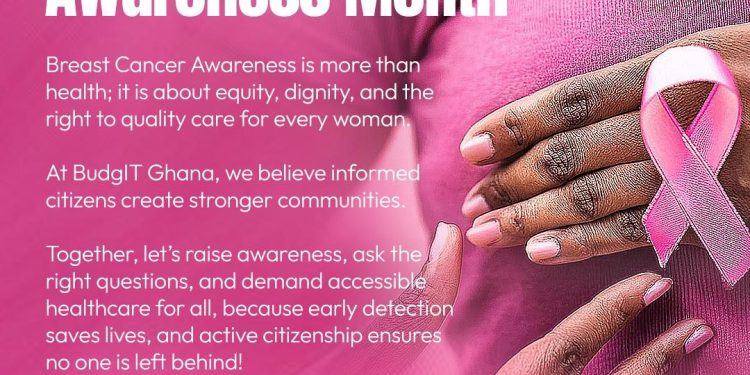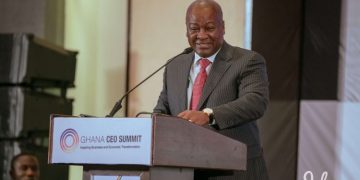Awareness to Action: Advancing Health Equity This Pink October
Every October, the world goes pink; a unified symbol of hope, solidarity, and a call to action in the fight against breast cancer. But in Ghana, this is far more than a colour. It is a call to public awareness, a civic moment where health intersects with governance, equity, and citizen empowerment. At BudgIT Ghana, our mission to promote transparency and accountability extends beyond budgets and public projects. It embraces the health of our people as an integral part of a just and functional democracy.
In Ghana today, breast cancer is no minor issue. According to the CanScreen5 fact-sheet, breast cancer is the most commonly diagnosed cancer among women in Ghana, with an incidence rate of 40.2 cases per 100,000 women in 2020 and the highest female cancer mortality rate at 19.3 per 100,000 women, while the rate for men stands at 2% in Accra according to MediFem. Meanwhile, studies show survival outcomes remain grim. In the Eastern Region of Ghana, three-year survival rates hover around just 52%. In addition, awareness remains intermittent; in one survey, although 87.5% of women had heard of breast cancer, only 44.4% had “adequate knowledge” of its risk factors. These statistics expose systemic challenges such as late presentation, limited screening access, weak health literacy, and inequities in care. For BudgIT Ghana, they signal another layer of accountability, not just in how budgets are spent, but how people’s health is protected and empowered.
This Pink October, we partnered with MediFem Hospital, a women-focused institution in Accra with a proud tradition of providing free annual breast cancer screenings. MediFem steps into the gap where national systems often struggle, offering screening, education, and outreach to women (and men) across socio-economic groups. In our recent interview with Dr. Suliat of MediFem, we explored the initiative’s vision, impact, and underlying civic dimensions.
“Early detection isn’t fear, it is strength,” Dr Suliat stressed. “We welcome women and men of all ages. Our goal is not only to detect, but to empower.” Dr. Suliat’s words reflect the inherently civic nature of health. MediFem’s screenings reach beyond hospital walls into workplaces, markets, and community centres. The outreach spans demographics such as students, market women, corporate teams, senior citizens, and men who rarely consider breast health. This initiative is tailored to go beyond just medical care to expand as a form of community mobilisation.
Yet even in this exemplary initiative, the barriers remain fundamental and structural. A 2024 study found the national prevalence of breast cancer screening among Ghanaian women of reproductive age to be only 18.4%. That figure shows that despite awareness campaigns, very few women have been screened. Presenting late is common: 56.5% of patients in one tertiary institution in Ghana were diagnosed at Stage III or IV, also revealing that late-stage presentation dramatically reduces survival chances and increases cost and complexity of treatment.
Dr. Suliat highlighted fear of diagnosis, misinformation, cultural myths, and cost concerns as key obstacles to treatment. She described how many women postpone screening until symptoms appear, by which point outcomes are often compromised. She shared stories of women who declined screening for years, only to arrive with advanced disease. MediFem’s campaign counters this with education sessions, myth-busting dialogues, mobile outreach, and digital engagement.
From a governance perspective, the lessons are clear. Health equity demands the same transparency, accountability, and citizen participation we call for in fiscal governance. When budgets allocate resources for cancer screening, awareness campaigns, or preventive care, the real metrics become who received those services, what barriers remain, how data is collected and shared, and how citizens are empowered. MediFem’s model offers a prototype where a health institution works with communities, enables access, tracks engagement, and embeds education in civic life.
For BudgIT Ghana, this month’s spotlight aligns with our broader perspective that active citizenship does not end at elections or public hearings; it encompasses every arena where voices, information, and rights converge. We advocate that budgets must make sense and that citizens must know their rights, access services, and engage in decisions affecting their lives. This means demanding data on screening coverage, monitoring how health funds are used, asking how many people were reached, in which regions, and whether outcomes improved.
Our Country Manager, Jennifer A. Moffatt, indicated during our engagements that “Health equity is governance equity”. As a citizen-centric organisation, we affirm this because we believe that when citizens understand their health rights, institutions are transparent and accessible, and governance shifts from passive recipients to informed participants, governance will become truly democratic.
This Pink October, we stand with MediFem Hospital and all those championing early detection, community awareness, and health justice. We invite every Ghanaian to make this personal and civic by getting screened, talking about it, sharing your story, asking questions, and joining the campaign. When a nation invests in prevention, transparency, and empowerment, not only healthcare but governance improves.








